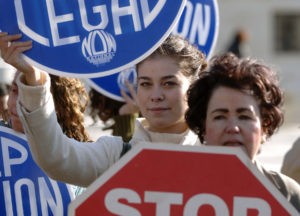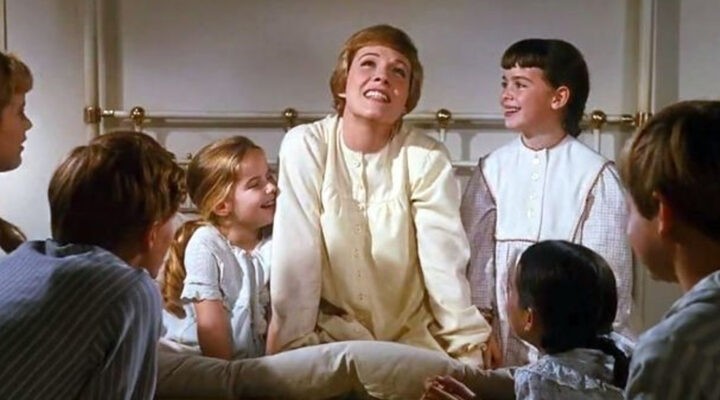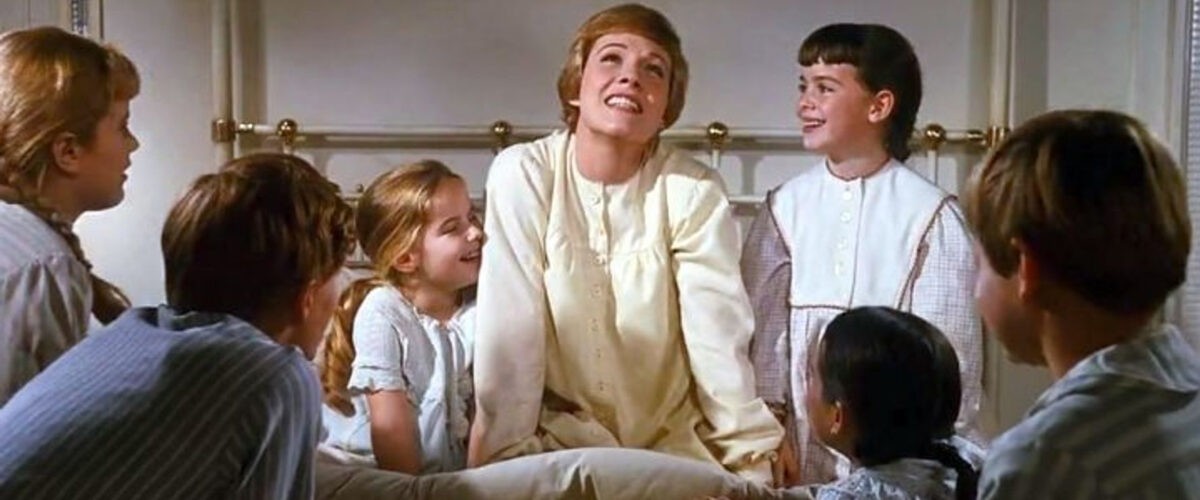Raindrops on roses, and whiskers on kittens;
Bright copper kettles, and warm woolen mittens;
Brown paper packages tied up with string;
These are a few of my favorite things.
Mark Wingfield used this song from The Sound of Music to illustrate what he wanted me to do when he asked me to write this column. You see, part of my job at Baptist News Global is to proofread every single piece we publish, and he thought it might be fun for me to highlight some of my favorites from this past year.
Now I know you might be thinking at this point that I’m not very good at my job, as no doubt you’ve all caught mistakes I missed. But one thing you can’t say about me is that I don’t enjoy my job. I love it! Getting to read everything we publish — 1,448 articles this year alone — is such a privilege.

Lindsay Bergstrom
So I agreed to list a few of my favorites, but let me say up front this was really hard. We published so many worthy pieces this year that gave us a record number of pageviews — more than 4.5 million — so you can imagine how hard it was. But I’ll do my best.
No. 1 on my list is “The true gospel is social” written by Rob Sellers. I chose this as my first for many reasons, but mainly because the writer gives us a wonderful historical look at how Baptists were on the forefront of living out their faith by caring for those in need, and because I believe with my whole heart that we should be doing the same.
Sellers tells the story of Walter Rauschenbusch, “a Baptist pastor and professor at a Baptist seminary … who had a deeply religious family heritage, a passion for helping needy people and an eagerness to share with them his faith in Jesus Christ.”
The America of Rauschenbusch’s day (the late 19th century) was not all that different from today, perhaps most notably in the ever-widening gap that separates the rich from the poor. Materialism, consumerism and out-of-control capitalism not only shaped the political choices and personal destinies of people then, but the same is true today. Don’t believe me? Just read our news coverage for the past year (or the hate mail we get almost weekly).
He proposes that “the Social Gospel encourages the recognition that communicating good news requires our actions as well as our words, a teaching consistent with James 2:14-17” — and I would also include Jesus’ own words in Matthew 24.
“If a believer and the church don’t live out the gospel socially, are they really embracing the true gospel at all?”
“The Social Gospel isn’t anything other than the whole gospel, after all,” he concludes. “It is the good news of the one who came to live among us, to share our sorrows and help carry our load, who gave himself for us and who calls us to do the very same for ‘the least of these, his ‘little ones.’”
So, I must ask, along with Sellers: If a believer and the church don’t live out the gospel socially, are they really embracing the true gospel at all?

Jordan Conn, of Rockville, Md, left, and Mary Susan Grayson, of Kensington, Md. hold signs supporting opposing views outside the U.S. Supreme Court on Wednesday, Nov. 30, 2005 in Washington. (AP Photo/Kevin Wolf)
No. 2 on my list is “When being ‘pro-life’ really isn’t: How I became a Democrat who opposes abortion” by Chris Conley. I chose this one because I believe it to be the most nuanced and comprehensive look at facts relating to how both of America’s major political parties have used the abortion issue as a bludgeon to stamp out any meaningful discourse on the matter.
Armed with facts, not hyperbole, the writer delicately weighs the rights of individuals for bodily autonomy against the intrusion of government as it relates to this very divisive issue. And as is true with much of life, simplistic answers never satisfy complex questions. But what made me really sit up and take notice are two facts I did not know: 1) that even though there are still way too many abortions, they have gone down steadily since Roe v. Wade became law; and 2) they have gone down more under Democratic administrations than under Republican ones.
“If there are fewer unwanted pregnancies, then there wouldn’t be the need for abortion, right?”
Wouldn’t you think with all the protesting and violence from “pro-life” groups and their support for Republican politicians who claim they will bring an end to abortions that it would be just the opposite? I would have thought that. So maybe the best way to reduce the number of abortions isn’t making them illegal. Maybe education and help for those who need assistance in getting access to health care and birth control would make the difference. If there are fewer unwanted pregnancies, then there wouldn’t be the need for abortion, right?
Speaking of simplicity, my No. 3 selection is Mark Wingfield’s “Everything that’s wrong with the world explained in one brief column.” Now I know what you’re thinking, and it just isn’t so. I’m not choosing this one to curry favor with my boss. In this column he makes a very astute observation — that most of what is wrong with the world today has to do with our selfishness — and I couldn’t agree more, even though we all are guilty of it to one degree or another.

(123rf.com)
“Call this illness what you will — being self-centered, myopic, closed-minded, self-protecting, unthinking, unchangeable, inwardly focused, nationalistic, racist, bigoted, whatever — but the reality is the same,” he says. “It is the sin of seeing the world only through our own lenses and assuming everyone has the same experiences as us, that everyone has the same advantages or disadvantages as us, seeking to protect our self-interests above all.”
He posits: “The greatest advancement we could make in this new year, the thing that would do the most worldwide good, the thing most likely to bring peace on earth, the thing that would make us most like God intends us to be is this simple thing: Let us remove ourselves from the center of the equation and see the world as God sees it.”
Wouldn’t that be the greatest thing indeed?

Elizabeth and Barbossa
My No. 4 choice comes with a bit of whimsy. I thought this title, “What do ‘The Hunger Games’ and ‘Pirates of the Caribbean’ have to do with American Christianity today?” was delightfully creative. In her piece, our Clemons Fellow Amy Hayes set out to show how America today is much like the Capitol in The Hunger Games. If you’ve read the books or seen the movies, you know the Capitol was set up to support a lavish lifestyle for some and relegate the rest of society to sacrificing their children to a kill-or-be-killed, winner-takes-all game with the hopes they could survive and bring resources back to their communities who had few. She suggests the Capitol would have allowed Christianity because “it’s easier to pervert faith than it is to persecute it.”
“In fact,” she says, “the loyalty and fervor of the faithful offer a strategic advantage to any empire that successfully harnesses them, so it’s more likely than not that the Capitol encouraged Christianity — at least an interpretation that supported, rather than threatened, their empire.”
“Beware of selling your souls for a few baubles or a place of advantage.”
Sound kinda familiar? Continuing on this thread Hayes says, “It takes a lot of theological acrobatics to force Christianity to make (nonthreatening) sense inside an empire. First, you must gut the Gospels of their obvious focus: justice and liberation for the least of these. Then you must fill the resultant vacuum with something, probably the pursuit of personal righteousness a la cultivating the fruits of the Spirit. Purity culture also works particularly well here. And then just spiritualize any remaining odds and ends that don’t already make sense, like God’s promises to provide for the physical needs of the poor.”
It’s a dire warning to us as a nation and as a faith community: Beware of selling your souls for a few baubles or a place of advantage.

A Department of Defense image of an unexplained object.
And finally at No. 5 is “With all this talk of UFOs, what’s a Christian to think?” by Rick Pidcock. I found this one fascinating, especially in light of all the recent TV shows exploring the existence of UFOs and extraterrestrials, featuring interviews with persons who have witnessed them. Archeologists who are studying the findings in ancient cultures suggest extraterrestrials may have come centuries ago, and more recent sightings suggest they could still be here. What are we to think about that as Christians?
Pidcock wonders why our understanding of space would affect our theology as Elliot Nelson suggests, “The possibility of alien life … forces us to ask what it means to be made ‘in God’s image.’” He says, “Christianity is cosmic. It makes bold claims about the nature and future of the physical universe … and must therefore face the challenge of modern cosmology.”
“But why would our understanding of space affect our theology of Jesus?” Pidcock asks. “While I understand the desire Christians have to define the Christ strictly in terms of the deity and physical body of Jesus, the reality we find in Scripture opens our understanding of Christ beyond the simplicity of his physical body.”
“Why must we limit God to what we can understand of our small little planet?”
Why must we limit God to what we can understand of our small little planet? We are but a speck in the larger cosmos. Haven’t we been taught that the triune God is ruler of all things in heaven and on earth?
So let me join with this writer in saying “as we prepare for the possible future discovery of aliens, let’s embrace the larger, stranger God that Brahe feared. Let’s dream of infinite worlds as Bruno imagined. Let’s be willing to re-examine our theologies of hierarchy in light of the relational cosmos we now know we have. Let’s find beauty in the atonement models of Abelard, St. Francis, St. Bonaventure, and Scotus. Let’s explore the Christian mysticism of Delio and Rohr. And let’s humble ourselves in becoming whole by following the lead of liberationist theologians who can model for us how love can liberate the earth from all oppressive powers toward a consciousness of wholeness where each civilization from across the universe is infinitely valued and immersed in love.”
Wouldn’t that be amazing?
Lindsay Bergstrom serves as director of operations for Baptist News Global, which is itself a simplified way of saying she does more things than we can list in this brief bio. The editor thanks her for this insightful list and testifies that he neither demanded nor hinted that his writing be included in the list. Although he is grateful, since no opinion piece he wrote in 2021 made the Top 15 most-read.
Related articles:
BNG’s Top 10 most-read analysis pieces for 2021 focused on vaccines and theology
BNG’s Top 15 most-read news stories for 2021
Sexuality, gender, pandemic and theology led BNG’s Top 15 most-read opinion pieces this year


